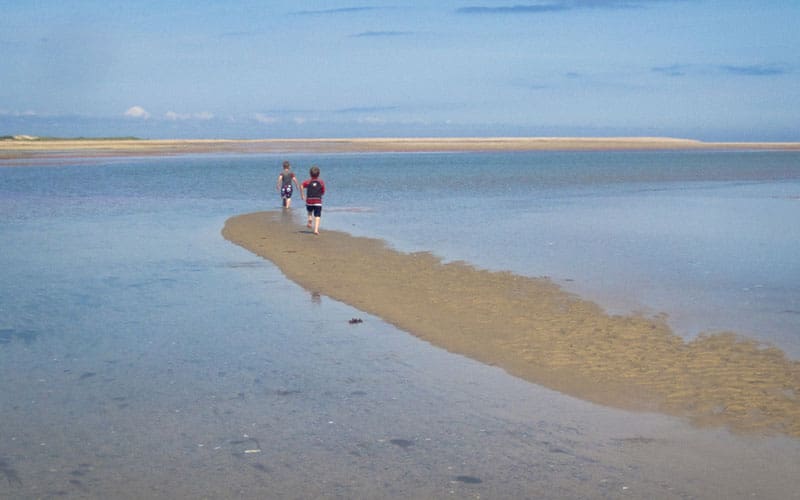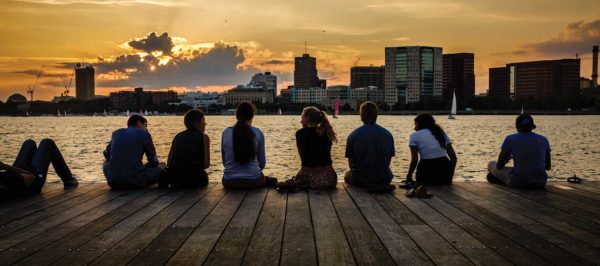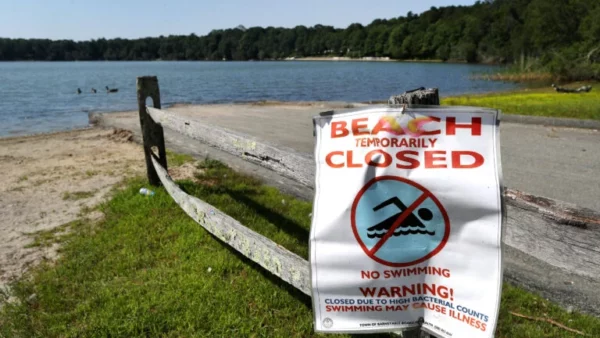
Barnstable town leaders want to roll back a local regulation meant to protect its waters from the ravages of nitrogen pollution. Photo: Don Rogers via CC-BY-NC-ND-2.0
A battle underway in Barnstable could have severe repercussions for the health of Cape Cod’s waters. On one side are those who are determined to build more and more “McMansions” in the mid-Cape community, no matter the cost to the environment. On the other, residents who recognize that, if the bays are destroyed, then the real estate market and the tourism economy will go with them.
Decades of Unchecked Development Are Killing Cape Cod’s Bays
Communities on Cape Cod have experienced extensive overdevelopment in the past 40 years. Summer visitors to the Cape are all too familiar with the traffic jams, lines, and limited access to popular outdoor destinations that have resulted.
The Cape’s fragile environment has suffered as well, with one of the worst outcomes being severe nitrogen pollution in the region’s beautiful bays. Nearly 85 percent of Cape Cod households rely on septic systems for treating waste. But these systems aren’t designed to eliminate nitrogen, which moves through the region’s uniquely porous soil and seeps into local waters. The nitrogen causes brown, slimy, smelly algae outbreaks that choke off life in the bays and turn them from gorgeous, sparkling waters into a nasty mess that no one can use.
Barnstable Leaders Want to Rescind Law Meant to Curb Pollution
As the Cape’s largest town, Barnstable illustrates the downside of the development boom. Barely 20,000 people lived there in 1970; today, the population is more than double that.
Barnstable’s bays have suffered from the unchecked pollution caused by overdevelopment. The Town has taken some baby steps to address the problem, including adopting regulations in 2008 that prohibit the construction of individual sewage disposal systems within Barnstable’s watersheds that have excessive levels of nitrogen. These regulations have slowed additional development that would make the pollution problem worse.
These regulations haven’t sat well with some in the town. Currently, Town leadership is putting forward a proposal to roll them back dramatically. As reported by the Barnstable Patriot recently, Board of Health member John Norman bluntly summed up the reason for the proposed roll-back: “’This interim regulation has handcuffed a lot of (new development) that we wanted to do,’ Norman said. ‘The town manager (Mark Ells) has made it clear: there are things we need to do going forward that this regulation is hindering.’”
Given that the algae outbreaks plaguing Barnstable’s bays can make people and animals sick, the irony of a Board of Health member supporting the rollback of these regulations shouldn’t be lost on anyone. And, if more development leads to even more pollution, then the tourists that power the Cape’s economy will find someplace else to go – a place with clean and healthy waters – sinking the local job and real estate markets in the process.
But ultimately, that is the problem on the Cape in a nutshell – developers want free rein to build on every available square inch, even if the bays are destroyed.
Slowing Development Isn’t Enough; Existing Infrastructure Must Also be Addressed
If the pollution in the Cape’s bays is ever to be corrected, not only will modest steps like the Barnstable regulations need to be implemented regionwide, but much more aggressive actions will be necessary also. They will need to include comprehensive upgrades of existing on-site septic systems and implementation of sewering where appropriate. At this point Barnstable doesn’t even have a comprehensive wastewater plan, so rescinding the 2008 regulations seems short-sighted at best, absurd at worst.
The battle in Barnstable provides yet another strong indication that the Massachusetts Department of Environmental Protection and the Environmental Protection Agency must stop avoiding the pollution issues on the Cape and develop regionwide programs that can correct the nitrogen disaster. The only way to clean up the bays is to prevent the pollution.
How You Can Help
Public outcry over this proposed rollback has already prompted the Town Health Board to delay a vote on it until January 22. That means you still have a chance to make your voice heard in this critical fight. If you live in Barnstable, contact your town councilors and Board of Health members; tell them you oppose any repeal of these critical water quality regulations. If you don’t live in Barnstable, but know people who do, please, urge them to speak out.
In the meantime, Conservation Law Foundation will continue to press for comprehensive solutions through recently filed lawsuits against two large resorts that are contributing to the problem. In the absence of governmental action to solve these problems, enforcing existing laws seems like the appropriate place to start.




